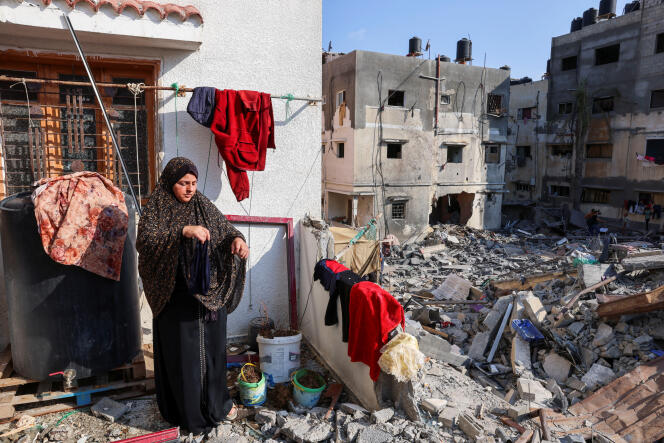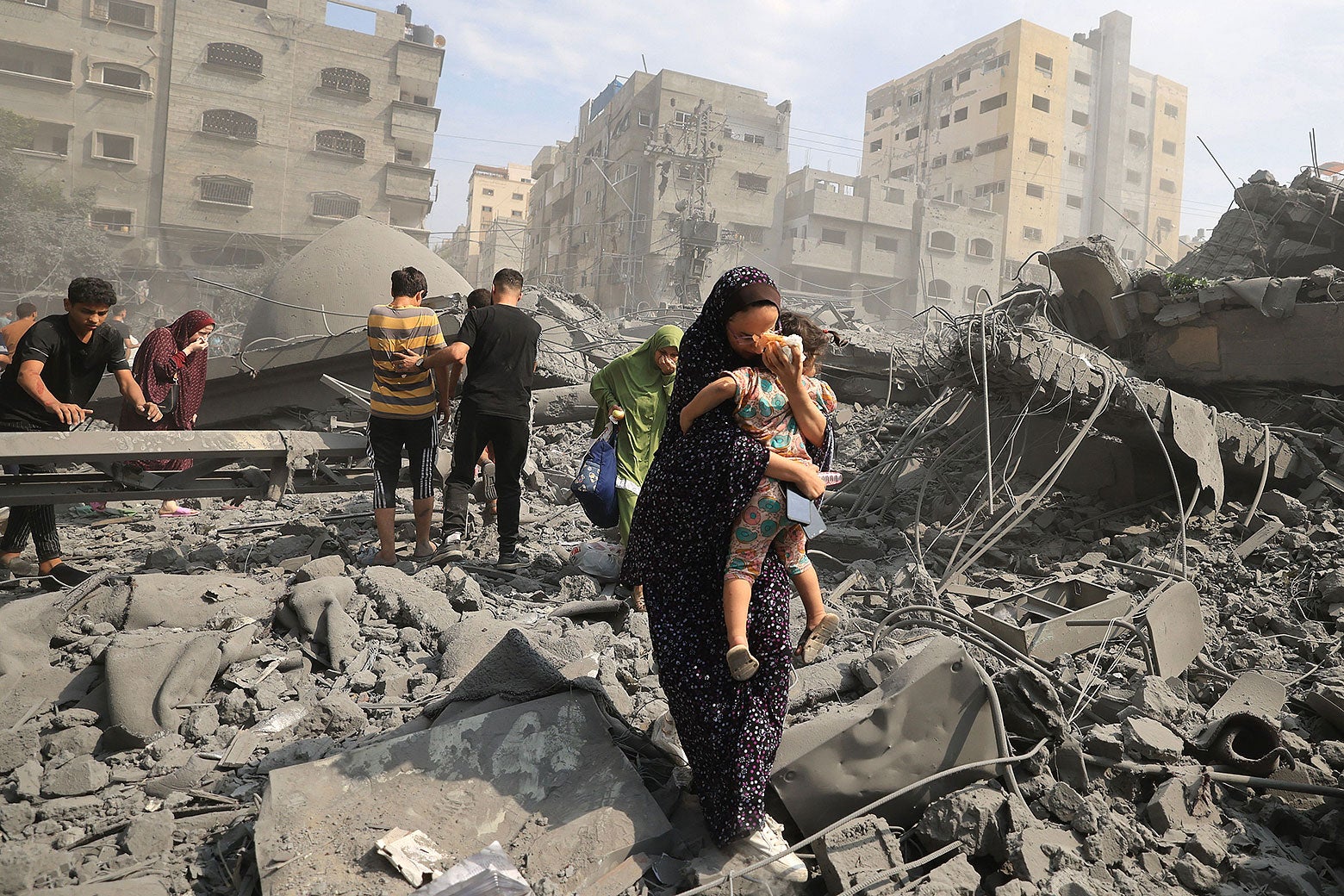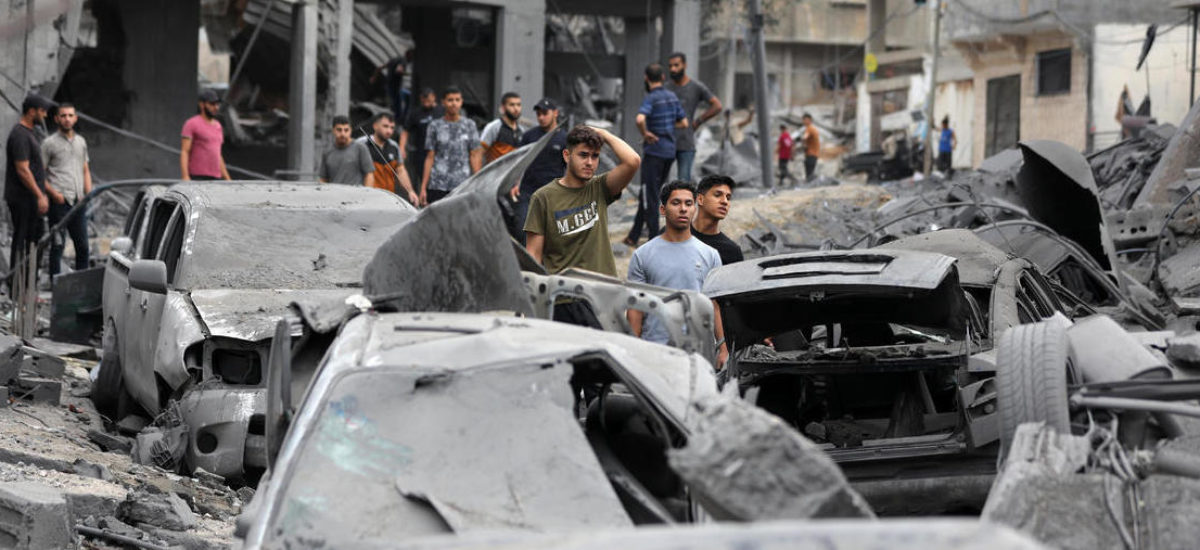“Gaza Is Running Out Of Water, And In Effect, Gaza Is Running Out Of Life”; Investigating A Deepening Humanitarian Crises; Israel Says Not Interested In Occupying Gaza; International Response to Gaza Crisis
The ongoing crisis in Gaza has spurred a flurry of diplomatic and humanitarian efforts to alleviate the dire situation and prevent further escalation— from the multifaceted responses from global leaders, the United Nations, and Israel to President Joe Biden's call for restraint to the ambitious collaboration between Israel and the UN in creating a humanitarian zone; there are many dynamics at play. Additionally, we examine how the Rafah crossing could provide a lifeline for Gaza's residents and the appointment of an envoy to coordinate aid efforts. Amidst the complex geopolitics, there is a shared goal—ensuring the safety of civilians and delivering essential supplies to those in need.

As Israel readies itself for the next phase of its conflict with Hamas, following the brutal attacks by the Palestinian militant group on October 7 that claimed the lives of 1,400 people, the Gaza Strip finds itself in a dire humanitarian crisis.
In the aftermath of a week filled with unprecedented airstrikes that have resulted in the deaths of more than 2,600 individuals, Israel is amassing troops and military resources along its border with this Hamas-controlled region.
Simultaneously, the United Nations has issued a warning to approximately 1.1 million people residing in the northern half of Gaza to evacuate.
As Israel prepares for a ground offensive in Gaza, let us look into what we should know about this 140 square-mile territory, which ranks among the most densely populated areas on Earth.

What is Gaza?
Gaza is a narrow strip of land, measuring roughly 25 miles in length and seven miles in width, just slightly larger than Washington DC. To the west, it is bordered by the Mediterranean Sea, while to the north and east, it is bounded by Israel, with Egypt to the south.
Gaza is one of the two Palestinian territories, the other being the larger West Bank, which is under Israeli occupation and shares its border with Jordan.
Who resides there?
Approximately 2 million people are squeezed into this 140-square-mile region; the majority of the population is young, with 50% being under the age of 18, as reported by the World Health Organization.
Almost all of Gaza’s inhabitants, around 98-99%, practice Islam, according to the CIA World Factbook, with the remaining few being Christians; of the residents, over 1 million are refugees, with eight officially recognized Palestinian refugee camps, according to the United Nations Relief and Works Agency.

Hamas’s long-standing control
In 2006, Hamas secured a decisive victory in Palestinian legislative elections, marking the last elections held in Gaza.
Hamas is an Islamist organization with a military arm that originated in 1987, stemming from the Muslim Brotherhood, a Sunni Islamist group founded in the late 1920s in Egypt; the organization views Israel as an illegitimate state and an occupying power in Gaza.
In contrast to other Palestinian groups, like the Palestinian Authority, Hamas refuses to engage with Israel and over the years, the group has claimed responsibility for numerous attacks on Israel and has been designated a terrorist organization by several countries, including the United States, the European Union, and Israel.
The most recent conflict between Hamas and Israel took place in 2021, lasting for 11 days and resulting in the deaths of at least 250 people in Gaza and 13 in Israel.
Israel’s Stand
Despite Israel’s withdrawal from Gaza, a tight grip has been maintained on the region through a land, air, and sea blockade since 2007.
For nearly 17 years, Gaza has been largely cut off from the outside world, with stringent restrictions on the movement of both people and goods; the blockade has faced severe criticism from international bodies, including the UN, which, in a 2022 report, stated that the restrictions have had a “profound impact” on living conditions in Gaza, leading to high unemployment, food insecurity, and aid dependency.
In Contrast, Israel has argued that the blockade is necessary to protect its citizens from Hamas.

“UN Relief Agency Head Warns, Gaza Faces Strangulation”
Philippe Lazzarini, the Commissioner General of the United Nations Relief and Works Agency, sounded an alarm about the dire situation in the Gaza Strip on Sunday, shedding light on the critical humanitarian crisis.
Lazzarini stressed that Gaza is rapidly depleting its water and electricity resources, and its population is confronting severe shortages of essential supplies like food and medicine.
Lazzarini lamented, “Gaza is being strangled, and it appears that the world, at this moment, has lost its sense of humanity. When we examine the issue of water — we all understand that water is life — Gaza is running out of water, and in effect, Gaza is running out of life.”
During a news conference, a journalist inquired about the restoration of water in southern Gaza; in response, Lazzarini stated, “We have not been able to confirm this yet. My understanding is that if there is any restoration of water, it would primarily benefit Khan Younis or half of Khan Younis. So, it would not cover the southern part of Khan Younis or the people in Rafah. However, it’s important to note that this information still requires confirmation. At this moment, our colleagues on the ground cannot verify this information.”
He painted a grim picture of an unprecedented humanitarian catastrophe, with thousands seeking refuge in UNRWA facilities, while their resources are stretched to their limits. “The number of people seeking shelter in our schools and other UNRWA facilities in the south is absolutely overwhelming, and we no longer have the capacity to accommodate them,” he added.
Lazzarini stressed the impact of the blockade, which, he noted, began 16 years before the recent conflict and had already placed a significant burden on the population, with over 60% of Gazans relying on international food assistance.
According to UNRWA, 14 of its staff members have lost their lives, and many others have been displaced or affected by the ongoing crisis, Lazzarini reported.
He fervently called for an immediate cessation of hostilities to prevent further loss of life, the lifting of the siege, and the establishment of a humanitarian corridor to ensure the delivery of essential supplies such as fuel, water, food, and medicine.
The Commissioner General emphasized the utmost importance of upholding international humanitarian law, stressing that all conflicts must adhere to its principles.

“US National Security Adviser Warns of Regional Escalation Amid Israel-Hamas Conflict”
On Sunday, US National Security Adviser Jake Sullivan raised concerns about the risk of a broader regional conflict in the Middle East as Israel carries out airstrikes in Gaza in response to unprecedented attacks by Hamas.
Sullivan stated, “There is a risk of an escalation of this conflict, the opening of a second front in the north, and of course, the involvement of Iran — that’s a risk. And this has been a risk we’ve been mindful of since the beginning.” He made these remarks on CBS’s “Face the Nation.”
Sullivan said the rapid deployment of an aircraft carrier to the eastern Mediterranean and the President’s dispatch of aircraft to the Gulf is to send a strong message of deterrence to any state or actor considering exploiting the current situation.
According to US Defence Secretary Lloyd Austin, the Pentagon has also ordered a second carrier strike group to the eastern Mediterranean, and Air Force fighter jets are being sent to the region as Israel prepares to expand its operations in Gaza.
It’s worth noting that the presence of two of the Navy’s most powerful vessels is intended to convey a message of deterrence to Iran and Iranian proxies in the region, such as Hezbollah in Lebanon.
Should Hezbollah become involved in the conflict, it could become a major flashpoint involving larger regional powers, including Iran and Saudi Arabia.
Israel has long accused Iran of engaging in a form of proxy warfare by supporting groups, including Hamas, that have launched attacks on its territory. Iran has consistently denied any involvement in the October 7 attacks.
US President Joe Biden, on the other hand, stated on Sunday that there is “no clear evidence” of Iran’s involvement in these attacks.

“Biden Cautions Against Israeli Occupation of Gaza, Calls for Restraint”
In an interview with CBS’ “60 Minutes,” which aired on Sunday, Biden conveyed that it would be a “big mistake” for Israel to consider an occupation of Gaza.
Israel has been signalling its readiness for a ground invasion of Gaza, even as a humanitarian crisis deepens within the coastal Palestinian enclave; Biden has repeatedly stressed the need to protect civilians, and the United States has been actively working to address food, water, and gas shortages.
Biden stressed his belief that the actions in Gaza by Hamas and its extremist elements do not represent the entirety of the Palestinian population, stating, “What happened in Gaza, in my view, is Hamas and the extreme elements of Hamas don’t represent all the Palestinian people.”
He went on to express his view that Hamas should be entirely eliminated but emphasized the need for a Palestinian Authority and a path towards establishing a Palestinian state.
These comments represent one of the rare instances where the U.S. president has called upon Israel to exercise restraint in response to the attacks by Hamas.
Dont Want To Occupy Gaza
Michael Herzog, the Israeli Ambassador to the United States, clarified that Israel does not intend to occupy Gaza once the conflict ends, stating, “We have no desire to occupy or reoccupy Gaza. We have no desire to rule over the lives of more than 2 million Palestinians.”
While these diplomatic discussions unfold, the humanitarian crisis in Gaza is deepening; the Hamas-controlled enclave, home to 2.2 million Palestinians, has faced relentless airstrikes in retaliation for the devastating terror attacks by the militant group on October 7.
As casualties continue to mount, aid organizations warn that they are running out of critical supplies, as Israel maintains a tight blockade on the densely populated territory.
Tens of thousands of northern Gaza residents are attempting to evacuate in response to the Israeli military’s warning of more airstrikes and significant ground operations in the “next stages of the war.”

Diplomatic efforts are taking center stage, with key statements from world leaders:
- United Nations: UN Secretary-General António Guterres expressed grave concern, stating that the Middle East is “on the verge of the abyss.” He called on Hamas to immediately release hostages without conditions and urged Israel to grant rapid and unimpeded access for humanitarian aid to reach civilians in Gaza.
- Jordan: Jordan’s Prime Minister criticized Israel for “blatant violations of international law” in Gaza, rejecting measures that could lead to the forced displacement of the Palestinian population. Jordan’s King Abdullah also condemned the denial of essential supplies to innocent civilians in Gaza as a war crime.
- European Union: The EU strongly condemned Hamas for its indiscriminate terrorist attacks across Israel and called for the immediate release of all hostages without preconditions. The EU is actively working to provide urgent humanitarian aid to Gaza’s civilians.
- Saudi Arabia: Crown Prince Mohammed bin Salman called for the immediate lifting of the siege on Gaza, condemning the targeting of civilians and destruction of critical infrastructure in the region.
- United States: US Secretary of State Antony Blinken engaged in diplomacy with regional leaders, pledging support for Israel’s security operations while urging measures to protect civilians and prevent further escalation. U.S. national security officials also held meetings with Arab and Muslim American community leaders to address the situation.
- Egypt: President Abdel Fattah el-Sisi expressed concerns that Israel’s response to the Hamas attack has exceeded the bounds of self-defense, leading to collective punishment of Gaza’s civilian population.

Israel Collaborating with UN to Establish Humanitarian Zone in Gaza, Ambassador Confirms”
Michael Herzog, the Israeli Ambassador to the United States, shared that Israel is actively engaged in partnering with the United Nations to create a substantial humanitarian zone within Gaza.
Speaking to CNN on Sunday, Herzog detailed the ongoing efforts, stating, “We are in the process of establishing a humanitarian zone, a large humanitarian zone in the southern part of Gaza, with the UN. We are working very closely with UN agencies so that they will go there — it will be a humanitarian zone, and they will receive all the essential provisions like water, medicine, food, and other necessities.”
Herzog indicated that this humanitarian zone would have the capacity to accommodate hundreds of thousands of people, emphasizing Israel’s commitment to acting within the framework of international law and ensuring the provision of essential requirements for the Palestinian population.
He stated, “We are operating under international law, and we are facilitating any essentials that the Palestinian population needs. That’s why we’re establishing this safe zone.”
/cdn.vox-cdn.com/uploads/chorus_asset/file/13456089/GettyImages_958322944.jpg)
Rafah Crossing Between Gaza And Egypt
US Secretary of State Antony Blinken, following a meeting with Egyptian President Abdel Fattah el-Sisi, assured that the Rafah crossing between Gaza and Egypt would be open.
Blinken stated, “Rafah will be open,” and went on to describe the establishment of a mechanism involving the UN, Egypt, Israel, and other stakeholders to facilitate assistance to those in need.
With Israel having closed its two border crossings with Gaza and imposed a “complete siege” on the territory, the Rafah crossing remains the primary means for people to exit Gaza and for supplies to enter; various countries have been engaged in discussions regarding the timing and extent of the crossing’s reopening.
Additionally, Blinken disclosed that President Joe Biden has appointed David Satterfield, the former US ambassador to Turkey, to oversee the coordination of aid efforts. Satterfield is expected to be in Israel on Monday to initiate this coordination.
Blinken stressed the importance of avoiding an escalation and securing aid for civilians in Gaza during his interactions with regional leaders such as Saudi Crown Prince Mohammed bin Salman.
While affirming the US’s support for Israel’s right to defend itself, he also expressed the hope that Israel would respond in a manner consistent with the shared values of human life and dignity.
Furthermore, Blinken underlined the presence of US strike groups in the region as a deterrent message and not intended to provoke, to ensure that the conflict does not widen or lead to aggression against Israel from any direction; he made it clear that the US is firmly committed to standing with Israel in terms of its security, both now and in the future.




